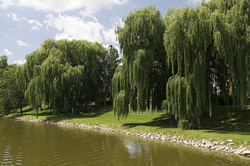
Full Grants:
- Cannon Township – $13,556.81 to study macroinvertebrate health on Bear Creek at five monitoring sites.
- Tip of the Mitt Watershed Council - $9,351.66 to monitor eight sites on the Maple and Sturgeon rivers, including macro-invertebrate and habitat assessments.
- Gogebic Conservation District - $8,975 to collect data on habitat and macro-invertebrates in the Black River and its tributaries in Presque Isle Watershed for tracking water quality changes over time.
- Clinton River Watershed Council - $1,350 to add six new sites to the existing stream monitoring program on the Clinton River.
- Start-Up Grants:
- Kalamazoo Nature Center - $3,000, Kalamazoo River Basin.
- Mason-Lake Conservation District - $2,988, Hamlin Lake and the Big Sable River Basin streams.
- Macatawa Area Coordinating Council - $2,980.48, Macatawa Watershed.
- Lake Leelanau Lake Association - $2,500, Lake Leelanau area streams.
- Cass River Greenway Committee - $1,033, Cass River.
The DEQ established the Volunteer Stream Monitoring Program in 1998 and contracted with the GLC to administer it as part of MiCorps in the fall of 2004. For additional information about the Michigan Volunteer Stream Monitoring grants, please visit the MiCorps Web site at www.micorps.net or contact Dr. Paul Steen of the Huron River Watershed Council at 734-769-5123 or by e-mail at [email protected].
Interested in becoming a volunteer monitor?
Please visit http://www.micorps.net or contact Paul Steen for more information!
The Michigan Clean Water Corps (MiCorps) was created through a executive order by former Governor Jennifer M. Granholm to assist the Department of Environmental Quality in collecting and sharing water quality data for use in water resources management and protection programs.
 RSS Feed
RSS Feed
